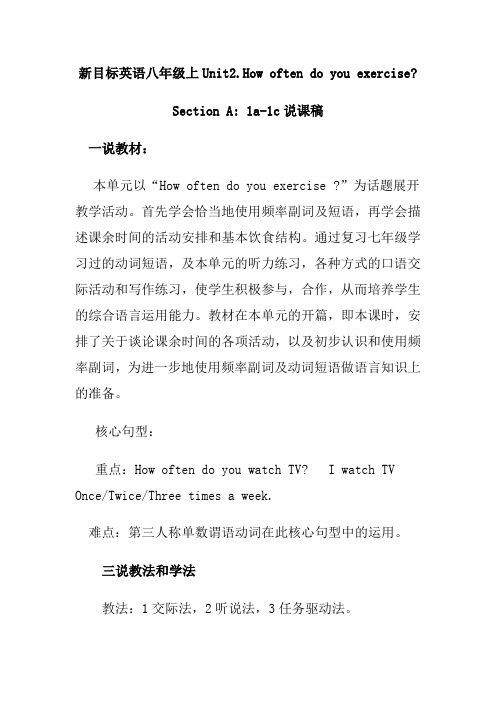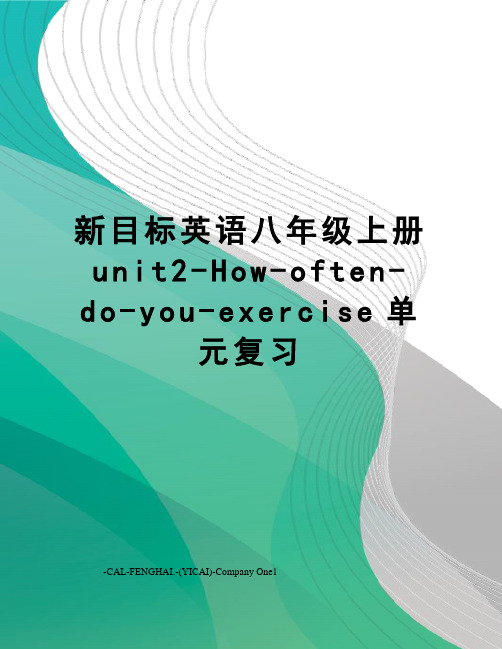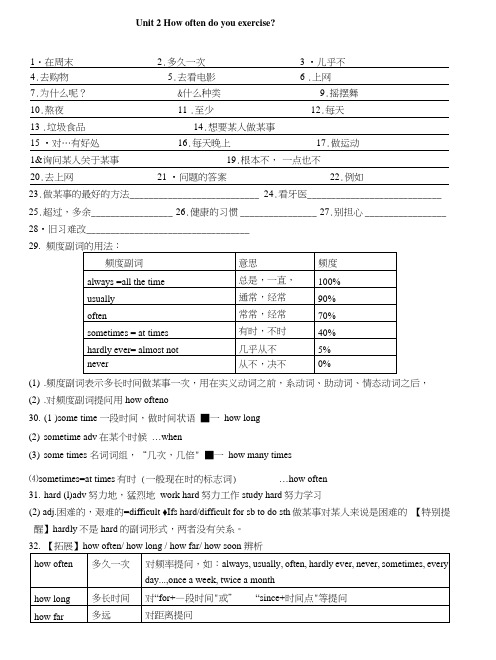新目标英语八年级上册Unit2 How often do you exercise?单元测试题
- 格式:doc
- 大小:41.00 KB
- 文档页数:5


Unit 2 How often do you exercise?单元教材分析的活动的习气和认识。
情感态度1.指点同学养成良好的活动和作息习气,合理安排各项活动,如周末活动(学习、劳动、文娱、熬炼等);2.培养同学良好的生活习气,如饮食习气、帮助父母干家务的习气等。
文明认识1.了解不同的人物的活动安排的特点,培养本人健康的生活方式;2.学会更合理地安排本人的课外活动。
课时教学设计第一课时Section A (1a-2d)1.通过看图说话、师生问答、听录音、角色扮演等方式,掌握本课时的housework,Internet,program,full,swing这几个词汇和hardly,ever,hardly ever,once,twice这几个频度副词和短语。
2.通过师生问答、角色扮演、调查采访、做游戏等方式,学会“How often…?”“I usually…”等句子结构,并能用之谈论、描述本人或他人的专业活动,同其他人沟通与专业活动有关的信息,谈论本人或他人进行某项活动的频率。
重点使同学掌握与专业活动相关的英语词汇及本课时的句型“What do you usually do on weekends?”“I always exercise.”“How often do you…?”“I…once a week.”让同学了解世界上其他国家人们的专业活动情况。
难点让同学运用所学言语项目How often do you…?谈论本人或他人的专业活动及其频率。
Step 1 情景导入通过师生自在交际进行复习与热身。
让同学回忆关于专业活动的词汇,例如watch TV, read books,exercise, go shopping,go to the movies 等。
通过师生谈论本人的专业活动,调动同学对本课话题的学习爱好,同时实现新旧知识的衔接,巩固已学知识,并引出本节课的学习话题。
For example:T:What do you usually do on weekends?S1:I usually help with housework.S2:I usually play basketball with my friends.S3:I usually go shopping.T:Do you usually go shopping on weekends?S1:Yes,I do.T:So do I.S2:OK.After class we'll go shopping.T:Do you usually watch TV on weekends?S3:No,I don't. I usually read a book.…(设计意图:本环节通过回忆之前学过的词汇进行课前热身,让同学打开记忆的大门,快速激活已有的知识库存,为下一环节的学习奠定基础。

Unit 2 How often do you exercise?Section A 1 (1a-2d)一、教学目标:1. 语言知识目标:1) 能掌握以下单词: housework, hardly, ever, hardly ever, once, twice, Internet, program, full, swing, swing dance, maybe, least, at least能掌握以下句型:① —What does he do on weekends —He usually watches TV.② —How often do you watch TV —I watch TV every day.③ —Does he go shopping —No, he never go shopping.2) 能了解以下语法:频度副词及一般现在时简单谈论周末活动情况。
2. 情感态度价值观目标:通过本单元的学习,养成健康的饮食习惯,保证充足的睡眠时间,进行合理的运动锻炼,以保持健康的体魄。
培养学生的逻辑表述能力,激发学生的积极思维,并使学生互相了解,增进友谊,加强人际交往,以形成良好的人际关系。
二、教学重难点1. 教学重点:1) 对6个频度副词细微差异的理解及使用。
2) 弄清一般现在时在不同人称下动词形式及提问的变化。
2. 教学难点:1) 第三人称单数谓语动词在此核心句型中的运用。
2) 谈论课余时间的各项活动,以及初步认识和使用频率副词。
三、教学过程Ⅰ. Lead inTalk about your last weekend’s activities.Ⅱ. Presentation(1) 教师问:“What do you usually do on weekends ” (并且板书)让学生根据自己的实际回答I usually …… on weekends.(2) 教师出示动词卡片 watch TV,read books,exercise,swimplay football、go shopping、go to movies让学生回答。

新目标英语八年级上Unit2.How often do you exercise?Section A: 1a-1c说课稿一说教材:本单元以“How often do you exercise ?”为话题展开教学活动。
首先学会恰当地使用频率副词及短语,再学会描述课余时间的活动安排和基本饮食结构。
通过复习七年级学习过的动词短语,及本单元的听力练习,各种方式的口语交际活动和写作练习,使学生积极参与,合作,从而培养学生的综合语言运用能力。
教材在本单元的开篇,即本课时,安排了关于谈论课余时间的各项活动,以及初步认识和使用频率副词,为进一步地使用频率副词及动词短语做语言知识上的准备。
核心句型:重点:How often do you watch TV? I watch TV Once/Twice/Three times a week.难点:第三人称单数谓语动词在此核心句型中的运用。
三说教法和学法教法:1交际法,2听说法,3任务驱动法。
学法:根据本课时的特点,我安排了七个环节,第一个环节让学生按老师的指令做动作来调整学生的精神状态,同时又复习了一些动词,为新课做知识上的准备;在第二个环节中,通过复习旧句型“What do you usually do on weekends ? ”,引出了七年级曾学过的频率副词usually/often/always/sometimes/hardly ever/never和一些动词短语,减轻学生学习新课的难度;第三环节,通过完成课本Activity 1a和Task 1来加强说和写的能力的培养;第四环节出现了本课时的重点,因为句型已掌握熟练,这些重点内容——新频率副词的使用,也迎刃而解,第五环节,是我在教学中的扩展和延伸,在完成课本Activity 1b和Task3的过程中,把学生们学习一般现在时态的难点,用对比的方式清楚地呈现给学生,使学生充分感知和理解,使学生在交际中对语言的认识得到升华。

新目标英语八年级上册u n i t2-H o w-o f t e n-d o-y o u-e x e r c i s e单元复习-CAL-FENGHAI.-(YICAI)-Company One1Unit 2 How often do you exercise 单元复习一、词汇1.频率副词always “总是”usually “通常” often “经常”, sometimes “有时”,hardly ever “几乎不” never “从未”。
2.次数一次两次特殊记,一次once 两次twice 三次及以上用数字+times频率副词放在动词或动词词组的前面,系动词be、助动词和情态动词之后次数放在动词或动词词组的后面He hardly ever helps with housework. 他几乎不帮忙做家务。
He is always lazy. 他总是很懒惰。
He helps with housework once a month. 他一个月帮忙做一次家务。
3. 活动词组go shopping 购物 go to the movies 去看电影 watch TV 看电视go online 上网 play computer games 玩电脑游戏 swim 游泳play soccer 踢足球 exercise 锻炼 help with housework帮忙做家务have a picnic 野餐 stay up熬夜 read books看书4.单元重点单词或词组①maybe 也许、可能、大概后接句子may be也许是、可能是、大概是后接名词或形容词只能放句中也许他是对的。
Maybe he is right. He may be right.②at least 至少,不少于基本放在所修饰的内容前面,也可以放在句尾我们至少一天扫三次教室。
We clean our classroom at least three times a day.她至少已经60岁了。

Unit 2 How often do you exercise?23.做某事的最好的方法___________________________ 24.看牙医____________________________ 25.超过,多余_________________ 26.健康的习惯________________ 27.别担心_________________ 28•旧习难改__________________________________29.频度副词的用法:(1).频度副词表示多长时间做某事一次,用在实义动词之前,系动词、助动词、情态动词之后,(2).对频度副词提问用how ofteno30.(1 )some time 一段时间,做时间状语■一how long(2)sometime adv在某个时候…when(3)some times 名词词组,“几次,几倍" ■一how many times⑷sometimes=at times有时 (一般现在时的标志词) …how often31.hard (l)adv努力地,猛烈地work hard努力工作study hard努力学习(2) adj.困难的,艰难的=difficult ♦Ifs hard/difficult for sb to do sth做某事对某人来说是困难的【特别提醒】hardly不是hard的副词形式,两者没有关系。
32.【拓展】how often/ how long / how far/ how soon 辨析33.次数的表达方法:once = one time —次twice= two times 两次三次或三次以上用:"基数词three times三次four times四次three or four times三到四次【注】:对次数提问用how many times。
help sb. (to) do sth =help sb. with sth.帮助某人做某事36.free ①adj.空闲的be free = have time有时间②adj.自由的,免费的be free to do sth.随心所欲的做某事37.full adj.忙的=busy adj.满的;充满的be full of = be filled with 充满3& least adv.最小,最少at least = not less than 至少;不少于39.health n 健康healthy adj 健康的(反[unhealthy40.although=though conj虽然,即使;不能与but连用,引导让步状语从句41.want sb. to do sth.= would like to do sth.想要某人做某事42.suchas “例如,像……一样”常常列举同类人或物中的几个例子,放在被列举的事物与前面的名词之间。
Unit2 How often do you exercise?Section B (1a-1e)Teaching Aims:1. 学习新单词:junkfood,coffee,health,2.掌握词组: how many, be good for,every day,two or three times a week.3.掌握句型:How often do you drink milk?How many hours do you sleep every night?She says i t’s good for my health.4.Learn to talk about how often they do things to keep healthy.Teaching Emphasis and Difficulties:1.New words,phrases and sentences.2.Talk about how often they do things to keep healthy.!Teaching Procedures:Step 1:Greeting and lead-in.谚语引入本节重点内容:养成良好的生活习惯才能带来健康!Step 2:Show the study-guide.1.Read the new words: junk food milk coffee2.Finish 1a and read the conversation in 1b3.Read the questions of 1c and 1d,Then try to translate.Step 3: Presentation教师展示实物:an apple tomatoes milk cola coffee and so on.1)Show a tomatoWhat’s this? Oh it’s a tomato,it’s a kind of vegetables,and it tastes sweet and kind of sour.but I think it’s very delicious ,too.I like eating tomatoes very much,Because they’re healthy food. And they’re good for our health.2)Show a box of milk..Do you like milk? Do you drink milk every day? Why /Why not?4)Show a glass of colaDo you like drinding cola?Yes,I do. I like it very much. It’s very delicious.Is it healthy food? No,it isn’t, It’s junk food,Do’t drink it too often!教师补充:I think most of you like drinking cola,I love it too, But you should drink less cola,Because it’s junk food,It’s bad for our health.Do you know what “junk food”mean?图片展示“junk food”5)Show a picture of coffee学习单词:”coffee”Have you ever drunk coffee? I don’t think it’s very delicious ,Because it’s a little bitter(苦).So I usually put some suger in it when I drink coffee,But some of the people like drinking coffee ,because it can give them energy. If they work too late at night,They usually drink some coffee,and they can go on working.Then show some pictures ,and let the Ss tell they are healthy food or junk food. What should we do to keep healthy?Step 4: Finish 1a and check the answers.Step 5: Pair workI want to know what eating habits you have ,so answer some of my questions! T:How often do you eat…?drink…?S :I eat/drink… every day/….T:Do you like it ?S:Yes,I do.It’s good for my health./No,I don’t.But my mother wants me to eat/drink it.Step5 :Listening:Work on 1c:Now ,we have known what our eating habits are ,do you want to know what habits Tina and Bill have?Now let’s begin our listening, a reporter is interviewing Bill and Tina what their eating habits are. Listen to the recordingand find the answer to these two questions: Does Tina have good habits? Does Bill have good habits? Listen and find the answers to the questions.3. T: Now let's work on 1d. First, let one student read the sentences and try to know the meaning of the sentences.4. Play the first time, Ss just listen. Play the tape for the second time for the Ss to listen and find the answers.5. Check the answers:Step 6:Do a survey.营养学专家李博士想了解我们中学生的饮食习惯.下面是一个小测试.你能够完成吗?A.good(16-20)B.OK (8-15)C. bad(8分以下)My eating habits are_______.Step 7:Pair work1. Work in pairs. Ask and answer questions. SA is the reporter. SB is Tina or Bill. Ask and answer questions.and write down the result.like this;e.g. ─How often do you eat vegetables?─I eat vegetables every day.─And how often do you eat fruit…?─I eat furit…2. Teacher can walk around the classroom, and give some help to the Ss.Step 8:Discussion.Work in groups, Then discuss who has good habitsStep9:Do a report according the discussion like this:I think I have good habits,I often eat fruit and drink milk,and I never drink cola……..I think my friend *** has good habits. He exercises every day,and he often eats fruit and vegetables……小组进行展示,表现好的予以奖励!Step10:升华提高As a student,we must have good habits,,How can we have good habits?we should have three meals every day and eat more fruit and vegetable.We should also eat less junk food ,We should often exercise and sleep nine hours every night.Sometimes we can watch TV but we should not watch too much,It’s bad for our eyes,we should use the interner,but remember we ‘d better not play computer games,It’s not good for you!Healthy habit can help us get good grades. Good food and exercise help us to study better.Finally,let’s end up with an English saying:Early to bed and early to rise makes a man healthy, wealthy and wise.早睡早起身体好。
人教新目标版英语八上Unit 2《How often do you exercise》(Period 4)教学设计一. 教材分析人教新目标版英语八上Unit 2《How often do you exercise》(Period 4)的主要内容是围绕频率副词和一般现在时进行交际。
通过本节课的学习,学生能够掌握频率副词的用法,询问和回答关于日常活动的一般现在时问题。
教材以实际生活场景为背景,让学生在真实语境中学习英语,提高他们的语言运用能力。
二. 学情分析八年级的学生已经掌握了基本的英语语法知识和一定数量的词汇,具备了一定的听、说、读、写能力。
但是,学生在使用英语进行实际交流时,往往会出现表达不准确、语法错误等问题。
因此,在教学过程中,需要关注学生的个体差异,充分调动他们的学习积极性,提高他们的语言运用能力。
三. 教学目标1.知识目标:学生能够掌握频率副词的用法,正确运用一般现在时进行交际。
2.能力目标:学生能够在真实语境中运用英语进行交流,提高他们的语言运用能力。
3.情感目标:培养学生热爱生活、关注健康的意识,使他们养成良好的生活习惯。
四. 教学重难点1.重点:频率副词的用法和一般现在时的交际运用。
2.难点:频率副词在实际语境中的准确运用,以及一般现在时在实际交际中的运用。
五. 教学方法1.情境教学法:通过生活场景的展示,让学生在真实语境中学习英语。
2.交际法:引导学生进行实际交际,提高他们的语言运用能力。
3.任务型教学法:通过完成具体任务,让学生在实践中掌握知识。
六. 教学准备1.教学课件:制作涵盖本节课主要内容的教学课件。
2.教学素材:准备相关的生活场景图片、视频等教学素材。
3.作业布置:提前为学生布置相关的预习作业。
七. 教学过程1.导入(5分钟)利用图片或视频展示一些运动场景,引导学生谈论日常生活中喜欢的运动。
教师提问:“What sports do you like?”,学生回答:“I like playing basketball.”等。
Unit2 How often do you exercise?单元测试题一、单项选择(15分)( ) 1. Is her lifestyle the same as yours or _____? What are the _____?A. difference; differentB. difference; differenceC. different; differencesD. different; different( )2.—_____ does your brother go online?—Three times a week.A. How muchB. How longC. How manyD. How often( )3. Are you _____ now?A. onlineB. the onlineC. a onlineD. the Internet( )4. Jenny _____ lifestyle.A. has a healthB. have a healthC. has a healthyD. have a healthy( )5. I try to eat junk food only once a month _____ I love it.A. throughB. butC. andD. although( )6. I knew nothing about the accident _____ my friend told me yesterday.A. becauseB. sinceC. untilD. after( )7. —_____? —I have a stomachache.A. What‟s the wrong.B. What‟s the wrong with youC. What‟s matterD. What‟s the matter with you( )8. If you want to _____, you must take more exercises.A. keep healthyB. keep tiredC. keep fatD. keep quiet( )9. —I hope you feel better soon. —_____.A. You are welcomeB. Thanks a lotC. That‟s all rightD. Never mind( )10. I don‟t feel _____ today.A. niceB. goodC. badD. well( )11. They are going to Europe ____ their vacation.A. onB. inC. toD. for( )12. —I ____ to bring my notebook.—No problem. You can borrow some paper from me.A. plannedB. decidedC. leftD. forgot( )13. Do you finish ____ the magazine?A. readsB. readC. readingD. to read( )14. Please ____ the book to me, Lily.A. buyB. makeC. showD. have( )15. The supermarket is far from Mary‟s house. So she ____only once a week.A. goes sightseeingB. goes shoppingC. goes fishingD. goes hiking二、完形填空(10分)What do you do at the weekends? Some people like to __1__at home. But others like to go for a walk __2__ play football. My friend Jack works hard in a factory on __3__. At weekends he always __4__different things. On Saturdays he __5__ his car and on __6__ he goes with his family to a village by car. His uncle and aunt have a farm there. It‟s not a __7__ one, but there‟s always __8__ work to do on the farm. The children help with the animals and give them their __9__. Jack and his wife help in the field. At the end of the day, they are all __10__and want tohave a big meal very much.( )1. A. play B. live C. stay D. like( )2. A. and B. or C. so D. but( )3. A. days B. time C. Sundays D. weekdays( )4. A. does B. makes C. borrows D. has( )5. A. watches B. sells C. looks after D. washes( )6. A. Mondays B. Sundays C. Saturdays D. weekdays( )7. A. small B. big C. hard D. short( )8. A. much B. little C. few D. many( )9. A. clothes B. places C. food D. water( )10. A. tired B. late C. hungry D. friendly三、阅读理解(20分)AWe all need to exercise. Doctors say it is good for us. It makes your heart and body strong. It also gives you more energy. And you will feel better about yourself. It‟s be st to exercise twice a week. Twenty minutes each time is enough.There are many ways to exercise. You can walk, run, play sports, or swim. Many people go to special places to exercise. They are called…fitness centers.‟These places have a lot equipment. Some people buy equipment for their homes. But it is very expensive.Exercising can be fun. Friends can exercise together at a fitness center. Or, they can play sports together. How do you exercise?1. What is the main idea?A.Exercise equipment is expensive.B. Playing sports is a good way to exercise.C.Every person should exercise.D. Fitness centers are popular.2. We should exercise ______.A. every dayB. 20 minutes a weekC. twice a weekD. two times a month3. At fitness centers, _____.A.you can buy expensive equipmentB. people can do many kinds of exercisingC. it is very expensiveD. exercising is not fun4. Which of these kinds of exercising is not in the article?A. Sports.B. Swimming.C. Running.D. Dancing.5. Which of these sentences about exercising is true?A. Exercising is expensive.B. Exercise is good for your heart.C. Only doctors exercise.D. Friends never exercise together.BOn June 26, 2000, two scientists, called Francis Collins and Craig Venter, told the world that they could now read the whole “map” of the human body: DNA. DNA is something that everybody has, and it tells the body what to do. DNA is the reason that we look like our mother and father, because we get some of their DNA to make our own.People have been trying to understand the human body for a long time. In 1860, Gregor Mendeldiscovered a special reason why we look the same as other people in our family. It is because of small t hings named “genes” in our body. In 1953, James Watson and Francis Crick made another discovery and found out that those small parts are real messages written in the DNA with a special language.In 1961, Marshall Nirenberg and Johann Matthaei found a message in DNA showing how DNA tells the cell (细胞) to build its parts. Scientists have now found all the words in the DNA map, but we still do not understand what they all do. By understanding what ju st one “word” means, we can help save more people from several illnesses.Most people hope that this will help make better medicine and help sick people. Other people worry that when people begin to know more words and find out lots of other information, we might use it in a wrong way, just to make people more attractive, or stop sick people from getting jobs. Man would have to meet a lot of trouble if DNA technic wasn‟t limited in use.根据短文内容,选择最佳答案。